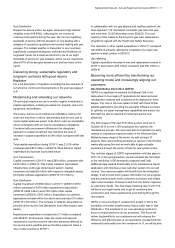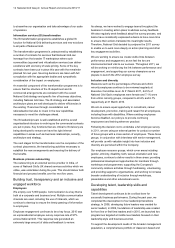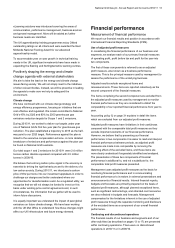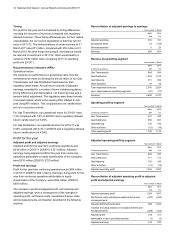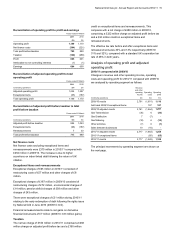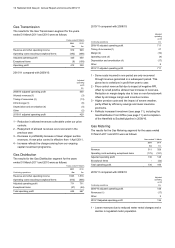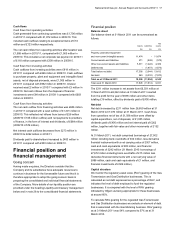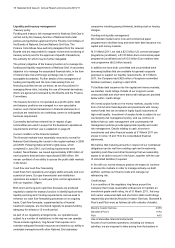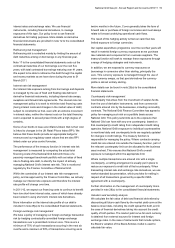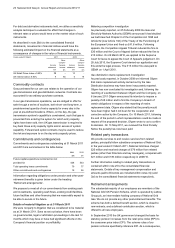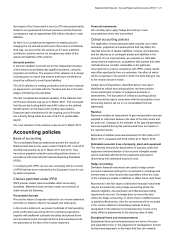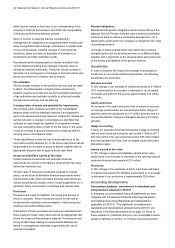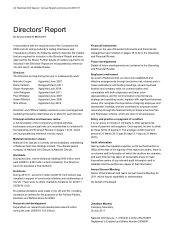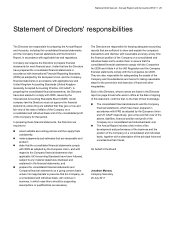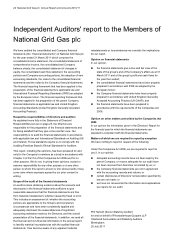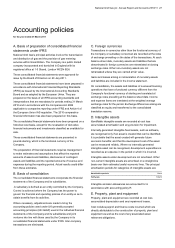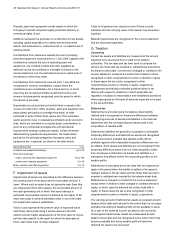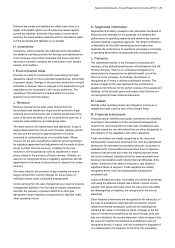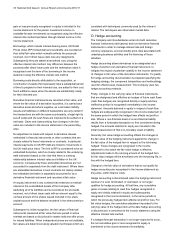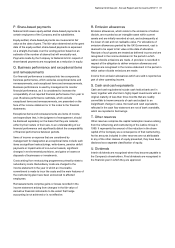National Grid 2011 Annual Report Download - page 23
Download and view the complete annual report
Please find page 23 of the 2011 National Grid annual report below. You can navigate through the pages in the report by either clicking on the pages listed below, or by using the keyword search tool below to find specific information within the annual report.National Grid Gas plc Annual Report and Accounts 2010/11 21
the impact of the Government’s move to CPI was predominantly
limited to our guaranteed minimum pensions and the financial
consequence was an approximate £50 million reduction in plan
liabilities.
As there is no contractual arrangement or stated policy for
charging the net defined benefit cost of the scheme to National
Grid Gas, we account for the scheme as if it were a defined
contribution scheme and do not recognise any share of the
assets and liabilities of the scheme.
Actuarial position
A triennial valuation is carried out for the independent trustees
of the scheme by professionally qualified actuaries, using the
projected unit method. The purpose of the valuation is to design
a funding plan to ensure that present and future contributions
should be sufficient to meet future liabilities.
The 2010 valuation is nearing completion and we have reached
an agreement in principle with the Trustees and are in the later
stages of finalising documentation.
The last completed full actuarial valuation of the National Grid
UK Pension Scheme was as at 31 March 2007. This concluded
that the pre-tax funding deficit was £442 million in the defined
benefit section on the basis of the funding assumptions.
Employer cash contributions for the ongoing cost of this plan
are currently being made at a rate of 29.4% of pensionable
payroll.
The next valuation of the scheme is due as at 31 March 2013.
Accounting policies
Basis of accounting
The consolidated financial statements present the results of
National Grid Gas for the years ended 31 March 2011 and 2010
and financial position as at 31 March 2011 and 2010. They
have been prepared using the accounting policies shown, in
accordance with International Financial Reporting Standards
(IFRS).
In complying with IFRS, we are also complying with the version
of IFRS that has been endorsed by the European Union for use
by listed companies.
Choices permitted under IFRS
IFRS provide certain options available within accounting
standards. Material choices we have made, and continue to
make include the following:
Presentation formats
We use the nature of expense method for our income statement
and total our balance sheet to net assets and total equity.
In the income statement, we present subtotals of total operating
profit, profit before tax and profit from continuing operations,
together with additional subtotals excluding exceptional items
and remeasurements. Exceptional items and remeasurements
are presented on the face of the income statement.
Financial instruments
We normally opt to apply hedge accounting in most
circumstances where this is permitted.
Critical accounting policies
The application of accounting principles requires us to make
estimates, judgments and assumptions that may affect the
reported amounts of assets, liabilities, revenue and expenses
and the disclosure of contingent assets and liabilities in the
accounts. On an ongoing basis, we evaluate our estimates
using historical experience, consultation with experts and other
methods that we consider reasonable in the particular
circumstances to ensure compliance with IFRS. Actual results
may differ significantly from our estimates, the effect of which
will be recognised in the period in which the facts that give rise
to the revision become known.
Certain accounting policies, described below, have been
identified as critical accounting policies, as these policies
involve particularly complex or subjective decisions or
assessments. The discussion of critical accounting policies
below should be read in conjunction with the description of our
accounting policies set out in our consolidated financial
statements.
Revenue
Revenue includes an assessment of gas transportation services
supplied to customers between the date of the last invoice and
the year end. Changes to the estimate of the gas transportation
services supplied during this period would have an impact on
the reported results.
Estimates of unbilled revenues amounted to £165 million at 31
March 2011 compared with £184 million at 31 March 2010.
Estimated economic lives of property, plant and equipment
The reported amounts for depreciation of property, plant and
equipment and amortisation of non-current intangible assets
can be materially affected by the judgments exercised in
determining their estimated economic lives.
Hedge accounting
Derivative financial instruments are used to hedge certain
economic exposures arising from movements in exchange and
interest rates or other factors that could affect either the value
of the Company’s assets or liabilities or affect future cash flows.
Movements in the fair values of derivative financial instruments
may be accounted for using hedge accounting where the
relevant eligibility, documentation and effectiveness testing
requirements are met. If a hedge does not meet the strict
criteria for hedge accounting, or where there is ineffectiveness
or partial ineffectiveness, then the movements will be recorded
in the income statement immediately instead of being
recognised in the statement of comprehensive income or by
being offset by adjustments to the carrying value of debt.
Exceptional items and remeasurements
Exceptional items and remeasurements are items of income
and expenditure that, in the judgement of management, should
be disclosed separately on the basis that they are material,


